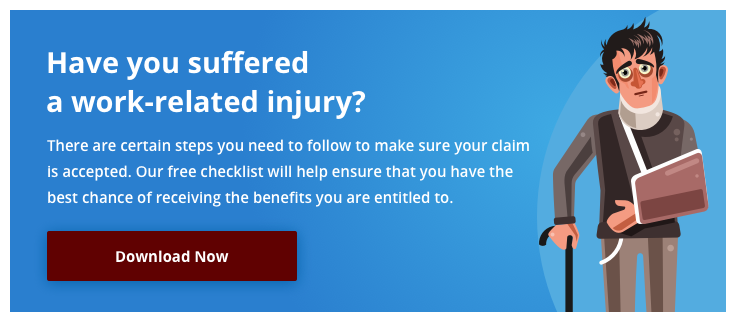 In California, your employer is required to pay certain benefits in the event you become injured while working on the job. A work injury can be a one-time traumatic event, or it can occur as the result of repetitive use, for example, repeatedly performing the same motion over and over.
In California, your employer is required to pay certain benefits in the event you become injured while working on the job. A work injury can be a one-time traumatic event, or it can occur as the result of repetitive use, for example, repeatedly performing the same motion over and over.
1. Know What Benefits You Are Entitled to Under California Law for Workers’ Compensation
You may be eligible for several different benefits as a result of your workplace injury. These benefits include medical care, permanent disability benefits, temporary disability benefits, job displacement benefits, and death benefits.
2. Report Your Injury to Someone in Management As Soon As Possible
It is important to notify your supervisor or someone in a management role as soon as you can after your injury occurs. Of course, if your injury is very traumatic, your first priority can and should be to seek immediate medical treatment. Once your condition has stabilized though, you will want to make sure someone in management is aware of your work injury.
By reporting your injury right away, you may be able to save yourself some headache and get your workers’ compensation benefits going sooner rather than later. The sooner you report your injury, the faster you may be able to get your benefits, such as medical care and temporary disability payments. If your injury is a repetitive-use injury, or an injury that developed gradually, such as carpal tunnel syndrome, you should report the injury to your supervisor as soon as you learn that it was caused by your work. If you wait too long to report your injury, you could potentially lose your right to benefits, so time is of the essence.
3. The Next Step After Reporting Your Injury—The Workers’ Compensation Claim Form
Before you report your injury, it is a good idea to prepare yourself for the next steps so that you can make sure your claim is handled properly. After you report your injury to your employer, your employer is required by California law to give you a claim form called the Workers’ Compensation Claim Form.
This form must be given to you (or mailed to you) within one work day after you have reported your injury. In the event your employer learned about it prior to you formally reporting it (which could happen if you were severely injured and your supervisor or someone in management actually witnesses the event) they must follow the same rule. If your employer does not give you the form, you may simply request one by contacting the Division of Workers’ Compensation Information and Assistance Offices.
Once you get a copy of the form, be sure to read the form in detail and then complete the designated employee section of the form. In this section, you will need to describe your injury in detail. It is important to list each body part that you injured. After you fill out your portion of the form, you will need to provide your employer with the form in order to start the filing process.
4. After Filing Your Claim Form with Your Employer—What Happens Next?
After you have turned in the claim form to your employer, your employer will fill out their section of the form and then turn the form over to their claims administrator. It will vary from employer to employer, but generally, a claims administrator works for an insurance company or another type of company that manages workers’ compensation claims for your employer. Your employer is obligated to give you a copy of the claim form completed by both you and the employer within one day after you file it. Then, the claims administrator will investigate your claim and must inform you whether your claim has been accepted or denied within 90 days.
5. It is Illegal for Your Employer to Fire You for Filing a Workers’ Compensation Claim
If you are nervous about reporting your workers’ compensation claim because you fear retaliation from your employer, it is important for you to know that your employer cannot legally fire you or punish you for having a work-related injury. Additionally, your employer cannot legally punish your co-workers if they testify for you in your case. This conduct is made illegal under Section 132a of the California Labor Code.
If you were injured at work and have questions or concerns about reporting your workplace injury, it is important to speak with an attorney that has experience handling workers’ compensation cases. By hiring an attorney, you can have someone on your side to fight for your rights to help you get the compensation you are entitled to.
